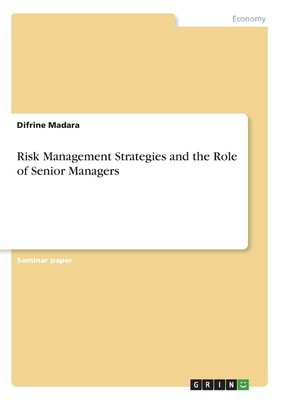
- We will send in 10–14 business days.
- Author: Difrine Madara
- Publisher: GRIN Verlag
- Year: 2020
- Pages: 28
- ISBN-10: 3346053970
- ISBN-13: 9783346053978
- Format: 14.8 x 21 x 0.2 cm, softcover
- Language: English
- SAVE -10% with code: EXTRA
Risk Management Strategies and the Role of Senior Managers (e-book) (used book) | bookbook.eu
Reviews
Description
Seminar paper from the year 2018 in the subject Business economics - Business Management, Corporate Governance, grade: A, Kenyatta University, language: English, abstract: Risks are inevitable in any business organisation. In this case, a company must put in place comprehensive measures to address various types of risks that a company may face. A senior manager of any organisation has a significant role to play in designing risk management strategies for the company. This report is, therefore, about the role of senior management in risk assessment, development of the company's risk management strategy, communication and ressourcing risk management strategies and the evaluation of outcomes. Risk management can be defined as the process of identifying, evaluating and prioritising risks supported by a well-coordinated efficient investment of ressources to minimise, monitor and control the probability of the occurrence of the unfortunate events and maximise attainment of opportunities. Risks originate from several sources, such as uncertainty in the financial markets, threats of project failure, legal issues, accidents, credit risks, and natural occurrences, among others. There are also cases where some events that have never happened before can occur, such as 9/11 terror attacks. These risks are referred to as unforeseeable risks. According to Nassim Taleb, unforeseeable risks are events, which are the rare but high impact on the business or organisation. In the contemporary business environment, inventions, such as social media and natural issues, such as global warming can have a massive impact on business thus the management should prepare for such issues or events appropriately. Risk management, therefore, encompasses strategies adopted by the organisation to ensure that the negative effects of these uncertainties are limited by avoiding, reducing, transferring or accepting the risk. However, risk management initiatives must also consider strategic risks. Basica
EXTRA 10 % discount with code: EXTRA
The promotion ends in 18d.14:20:48
The discount code is valid when purchasing from 10 €. Discounts do not stack.
- Author: Difrine Madara
- Publisher: GRIN Verlag
- Year: 2020
- Pages: 28
- ISBN-10: 3346053970
- ISBN-13: 9783346053978
- Format: 14.8 x 21 x 0.2 cm, softcover
- Language: English English
Seminar paper from the year 2018 in the subject Business economics - Business Management, Corporate Governance, grade: A, Kenyatta University, language: English, abstract: Risks are inevitable in any business organisation. In this case, a company must put in place comprehensive measures to address various types of risks that a company may face. A senior manager of any organisation has a significant role to play in designing risk management strategies for the company. This report is, therefore, about the role of senior management in risk assessment, development of the company's risk management strategy, communication and ressourcing risk management strategies and the evaluation of outcomes. Risk management can be defined as the process of identifying, evaluating and prioritising risks supported by a well-coordinated efficient investment of ressources to minimise, monitor and control the probability of the occurrence of the unfortunate events and maximise attainment of opportunities. Risks originate from several sources, such as uncertainty in the financial markets, threats of project failure, legal issues, accidents, credit risks, and natural occurrences, among others. There are also cases where some events that have never happened before can occur, such as 9/11 terror attacks. These risks are referred to as unforeseeable risks. According to Nassim Taleb, unforeseeable risks are events, which are the rare but high impact on the business or organisation. In the contemporary business environment, inventions, such as social media and natural issues, such as global warming can have a massive impact on business thus the management should prepare for such issues or events appropriately. Risk management, therefore, encompasses strategies adopted by the organisation to ensure that the negative effects of these uncertainties are limited by avoiding, reducing, transferring or accepting the risk. However, risk management initiatives must also consider strategic risks. Basica


Reviews